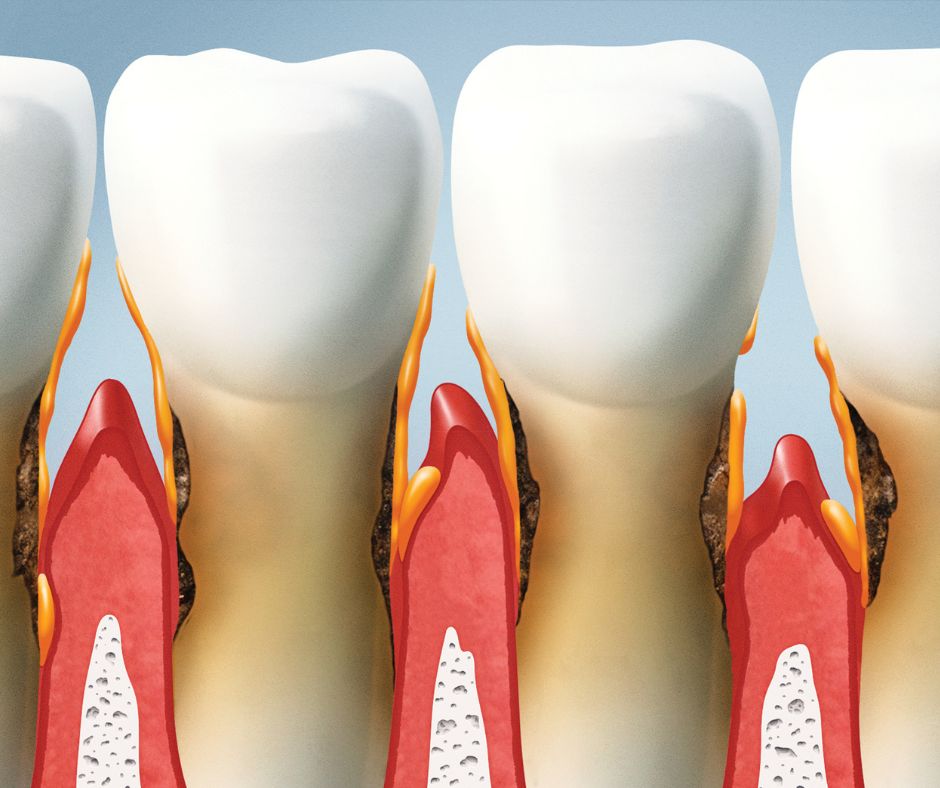Blog Page & News Articles
Understanding Dental Pockets: Why They Matter for Your Oral Health
Author: Dr Behnam Aminnejad. Posted: 12.11.24
When it comes to oral health, we often focus on brushing, flossing, and routine cleanings, but there’s another important area to consider: dental pockets. Dental pockets, also known as periodontal pockets, are spaces that can form between the gums and teeth. These pockets play a critical role in oral health and, if left unaddressed, can lead to serious dental issues, including gum disease and even tooth loss.
In this article, we’ll dive into what dental pockets are, why they’re important, and how you can care for them to keep your smile healthy.
What Are Dental Pockets?
In a healthy mouth, gums fit snugly around the teeth, with only a small gap that helps keep teeth stable and supported. When gums are irritated or become infected, however, they can start to pull away from the teeth, creating a space known as a periodontal or dental pocket. If the depth of this pocket becomes too large, it can become a harbor for bacteria, plaque, and tartar, which can, in turn, cause inflammation and infection in the gums.
Periodontal pockets are typically measured by a dentist or dental hygienist using a special tool called a periodontal probe. A healthy pocket depth is generally between 1 and 3 millimeters. Pockets deeper than 4 millimeters can be a sign of periodontal disease, and pockets greater than 6 millimeters are typically associated with more severe gum disease that may require professional intervention.
Why Dental Pockets Are Important for Oral Health
Dental pockets aren’t just a sign of gum health—they’re also a potential risk factor for long-term dental and overall health problems. Here’s why:
- Gum Disease: As plaque accumulates in deeper pockets, bacteria flourish, which can lead to gum disease, or periodontitis. Gum disease is the most common cause of tooth loss in adults and can lead to chronic bad breath, bleeding gums, and even jawbone damage if left untreated.
- Bone Loss: When bacteria and infection penetrate deeper, they can start to break down the bone that supports your teeth. This can result in loose teeth and, eventually, tooth loss.
- Systemic Health Concerns: Research has shown that gum disease and dental pockets are linked to several systemic health issues, including heart disease, diabetes, and respiratory illnesses. Keeping dental pockets healthy helps lower the risk of these serious conditions.
How to Prevent and Care for Dental Pockets
Thankfully, preventing and managing dental pockets is possible with good oral hygiene practices and regular professional care. Here are some key steps to keep them in check:
- Brush Twice a Day: Use a soft-bristled toothbrush to clean your teeth and gums gently but thoroughly. An electric toothbrush can be especially effective at removing plaque and preventing gum irritation.
- Floss Daily: Flossing reaches areas your toothbrush can’t, like between your teeth and just below the gumline. It’s one of the best ways to prevent plaque buildup in dental pockets.
- Use an Antibacterial Mouthwash: A mouthwash can help reduce bacteria in your mouth and prevent infection in your gums. Look for one that specifically targets gum health or has antibacterial properties.
- Schedule Regular Dental Check-Ups and Cleanings: Professional cleanings remove plaque and tartar that regular brushing and flossing miss. During these visits, your dentist or hygienist will check pocket depths to ensure your gums are healthy.
- Consider Deep Cleaning Treatments If Needed: If you already have deep pockets, your dentist may recommend a scaling and root planing treatment. This is a deep-cleaning procedure that removes plaque and tartar from below the gumline, helping gums to reattach to the teeth and reduce pocket depth.
- Adopt a Healthy Lifestyle: Eating a balanced diet and avoiding tobacco products are excellent ways to improve gum health. A healthy immune system helps fight off infections and inflammation, reducing the likelihood of gum disease.
When to See a Dentist
If you notice symptoms like bleeding gums, persistent bad breath, swollen or tender gums, or receding gums, it’s important to visit your dentist for an evaluation. These signs may indicate gum disease or deep dental pockets that need attention. By catching these issues early, your dentist can recommend effective treatments to prevent further progression and help you maintain a healthy smile.
Conclusion
Dental pockets are a critical yet often overlooked part of oral health. Caring for your gums and keeping an eye on pocket depth can help protect your teeth and gums from serious conditions, from gum disease to tooth loss. Remember, regular dental visits are essential to track your gum health and treat any issues before they become serious. By taking these preventative steps, you’re not only caring for your teeth but also promoting overall health.
Keep smiling, and remember that healthy gums mean a healthy mouth!
Read more of Dr Behnam Aminnejad's dental care articles and tips: Back to Blog

Why Choose Us?
- Master's degree in Endodontic (Root canal treatment)
- Almost 30 years experience
- All dental treatments are individually tailored to your specific needs
